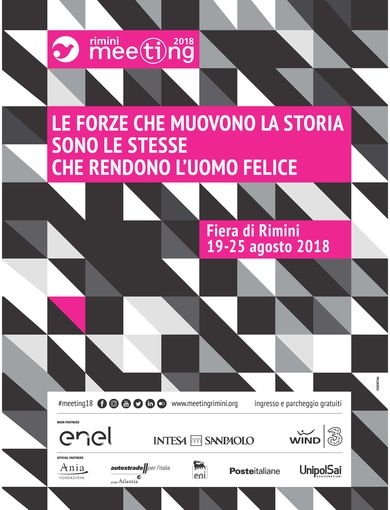
2018 Edition

The forces that move history are the same that make man happy
“Who is the man that longs for life and desires to see good days?” The question stands out in the Prologue to the Rule of Saint Benedict, and marks the beginning of the striking journey of humanization and civilization of the world that was capable of building Europe in the face of the decadence of the great Greco-Roman tradition and the violence of the barbarians. Pope Francis quoted this question recently in his “Speech on Europe,” in late October 2017. An individual man discovered in his personal experience that the crucial point of all of history, space and time was the expectancy of happiness, an expectancy that was unceasingly re-born in the encounter with a new, strange human Presence that cannot be reduced to the sum of the mere capacities of the human person, a different gaze that, looking at us, enables us to see everything in a different way, positive and free.
Is this not perhaps the question behind all our efforts, the question that determines the projects and attempts of life, personal and social, cultural and political, economic and scientific? Doesn’t this expectancy sustain our efforts to build, and also re-emerge at the bottom of all our disappointments?
Today as well, in the global situation of uncertainty and violence that marks our world, these disarming questions constitute our true, great resource. They arise above all when we happen upon events that are significant for existence: the encounter with particular, historical people and situations that testify to us about the nature of reality, which is not something threatening, to be defended against, or something that we decide a priori and impose on others, but a space in which we discover the challenge of what is “other” than us, and a time when different relationships among people and between people and things can be formed and develop, not in order to eliminate someone or something, but to enjoy what we discover in common with them, something free that crosses through our projects, and gives them that freedom and humility—one might say that “poverty”—that permits a shared gain.
As Fr. Giussani once noted, the solution to the problems life poses to us every day “does not come from addressing the problem directly, but from exploring more deeply the nature of the individual who faces them.” This is the burning question that always remains open: what makes truly concrete, weighty and useful our efforts to resolve the issues we face daily in our personal life and in the world? What do we truly seek for ourselves and the people who are important to us?
These questions can only be answered by witnesses, because when you see something happen that truly measures up to your desire for happiness, your judgment on what is in front of you becomes clear, and your true responsibility, that to which you are called, is illuminated. The Meeting, following the method with which it began and has developed over these forty years, will propose the encounter with witnesses from the fields of economics, politics, society, science, art, and history, looking deeply at the spheres of daily life for everyone, from health to work, from mobility to innovation, focusing on human vicissitudes that, at times quietly and with apparently little impact, plant seeds of newness destined to flower, to create new horizons of knowledge.
And, once again, the Meeting will be a dialogue with different experiences and cultures, to grasp the questions of today’s women and men, above all those of the young generations, following the fascinating hypothesis that perhaps the forces that can make us happy are the same ones that can move history, with all the time and patience that will be needed.









